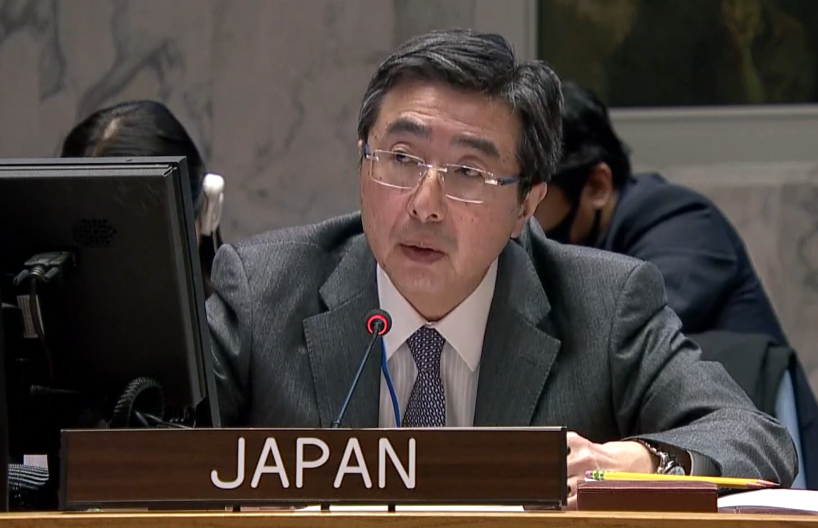Statement by H.E. Ambassador ISHIKANE Kimihiro, Permanent Representative of Japan to the United Nations, at the United Nations Security Council Briefing on Children and Armed Conflict
2023/2/13

(As delivered)
Madam President,
I thank Ms. Virginia Gamba, Ms. Maalla M’jid, and Ms. Divina for their insightful briefings.
This year marks the fifth anniversary of the adoption of Resolution 2427, which underscores the protection of children as a key to preventing conflict and sustaining peace.
Japan highly values the efforts and achievements made to date in this regard. However, it is regrettable that children in armed conflict continue to experience grave and large-scale violations of their most basic rights.
Japan urges all parties to armed conflict to fully comply with their obligations under international law and implement all Security Council resolutions on children and armed conflict.
We need to recall Security Council Resolution 2427, unanimously adopted in 2018, strongly condemns attacks against schools and urge all Members States that attacks on schools are investigated, and those responsible are duly prosecuted.
Madam President,
One of the concrete tools to protect children from armed conflict highlighted in Resolution 2427 is ensuring access to quality education. Ms. Divina also pointed out the importance of education in promoting children’s participation in decision-making.
Access to quality education is a fundamental human right and a powerful tool to prevent and mitigate conflict. It helps stop the recruitment of child soldiers and also provides necessary skills for the reintegration and rehabilitation of children affected by conflict.
From this viewpoint, Japan has supported a number of education programs in conflict-affected countries. For instance, JICA has for many years provided non-formal literacy programs for girls and women and teacher trainings in Afghanistan. Also, with Japan’s funding assistance, UNICEF supported the Government of Burkina Faso to construct secondary schools and develop specific learning modules for promoting peace and social cohesion.
Building on the outcomes of the Transforming Education Summit last year, Japan is ready to accelerate our efforts in ensuring inclusive and equitable educational opportunities for all children and youth, including those affected by conflict.
Children must not fall victim to armed conflict; for they are seeds of hope to build peace and sustainable development.
We should spare no effort in improving learning environments and ensuring access to safe and quality education, and guarantee human security for all children. Japan will continue to work closely with other Member States, the United Nations system, international humanitarian organizations and civil society organizations in this endeavor.
I thank you.
I thank Ms. Virginia Gamba, Ms. Maalla M’jid, and Ms. Divina for their insightful briefings.
This year marks the fifth anniversary of the adoption of Resolution 2427, which underscores the protection of children as a key to preventing conflict and sustaining peace.
Japan highly values the efforts and achievements made to date in this regard. However, it is regrettable that children in armed conflict continue to experience grave and large-scale violations of their most basic rights.
Japan urges all parties to armed conflict to fully comply with their obligations under international law and implement all Security Council resolutions on children and armed conflict.
We need to recall Security Council Resolution 2427, unanimously adopted in 2018, strongly condemns attacks against schools and urge all Members States that attacks on schools are investigated, and those responsible are duly prosecuted.
Madam President,
One of the concrete tools to protect children from armed conflict highlighted in Resolution 2427 is ensuring access to quality education. Ms. Divina also pointed out the importance of education in promoting children’s participation in decision-making.
Access to quality education is a fundamental human right and a powerful tool to prevent and mitigate conflict. It helps stop the recruitment of child soldiers and also provides necessary skills for the reintegration and rehabilitation of children affected by conflict.
From this viewpoint, Japan has supported a number of education programs in conflict-affected countries. For instance, JICA has for many years provided non-formal literacy programs for girls and women and teacher trainings in Afghanistan. Also, with Japan’s funding assistance, UNICEF supported the Government of Burkina Faso to construct secondary schools and develop specific learning modules for promoting peace and social cohesion.
Building on the outcomes of the Transforming Education Summit last year, Japan is ready to accelerate our efforts in ensuring inclusive and equitable educational opportunities for all children and youth, including those affected by conflict.
Children must not fall victim to armed conflict; for they are seeds of hope to build peace and sustainable development.
We should spare no effort in improving learning environments and ensuring access to safe and quality education, and guarantee human security for all children. Japan will continue to work closely with other Member States, the United Nations system, international humanitarian organizations and civil society organizations in this endeavor.
I thank you.
